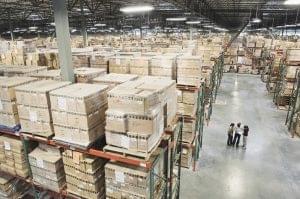Supply chain management issues in the food industry
In crisis situations supply chain management is strategically important for food companies. The war between Ukraine and Russia causes problems in the food sectors of many countries, as Ukraine is one of the biggest agri-food exporters in Europe.

Guest writer:
Flóra Bagyinka
manager
PwC Hungary
According to the Central Statistical Office (KSH), food, drink and tobacco production represented a value of HUF 4,456bn in Hungary in 2021, being the third biggest industry. Hungary has close economic ties with Ukraine, so the crisis there affects our food production. For instance some Hungarian food companies are facing an ingredient shortage because of losing their suppliers, but demand for products can also increase if competitors go out of business, but it is also possible that demand drops due to the reduction of buyers in Ukraine.
Problems
Some of the biggest problems caused by the war in Ukraine occur in supply chain management, and this puts great pressure on the managers and workers who are active in this field. There are so many unexpected changes in demand (for instance because competitors or buyers disappear) that sometimes sales forecasts must be changed several times a day. This entails extra work and also influences the work in the next link of the supply chain. Plus changes in the sales plan have an impact on the production plans of the given period; since purchasing is done based on the production plan, this area also needs to adapt to the new situation. The risk in constantly changing plans is that the supplier can’t deliver on time. If demand for products increases, the lack of adequate warehouse capacity can also be problematic. When warehouses are too busy, the waiting time of trucks increases, causing further supply problems.

In order to solve the problems arising from the Ukranian crisis, mapping of the entire supply chain and designing rapid actions in response are inevitable
Solutions
The problems caused by the war in Ukraine can’t be solved without reviewing the complete supply chain and taking steps quickly. One of the keys to this field’s success is the harmonisation of related functions, monitoring performance all the time, and having an ERP system with the necessary functions (e.g. production management, sourcing, warehousing logistics). There are also other things we can do to improve the working of the supply chain: more accurate demand forecasting and quicker adaptation to the regular changes becomes possible with the introduction of a planning assistance system, it is best if the supplier portfolio is diverse and a strategic cooperation agreement is signed with the key suppliers, etc. Because of the problems caused by the crisis, it is very important for manufacturers to make sure that they are taking their supply chain management to the next level. //
Related news
SMEs can apply for HUF 48 billion in non-refundable equipment purchase support
Micro, small and medium-sized enterprises can apply for 48 billion…
Read more >Polish Deputy Prime Minister: the EU-Mercosur cooperation agreement threatens Polish agriculture
The cooperation agreement to be concluded between the European Union…
Read more >Related news
After a subdued year, the holiday season is strong
74% of online shoppers, around 3.1 million people, are preparing…
Read more >Lidl has published its 3rd sustainability report
Lidl Hungary’s sustainability report for the 2022/2023 business years has…
Read more >Battle of the regions: these are the most popular dishes according to Hungarians
Five times the national average of Mexican food is consumed…
Read more >






